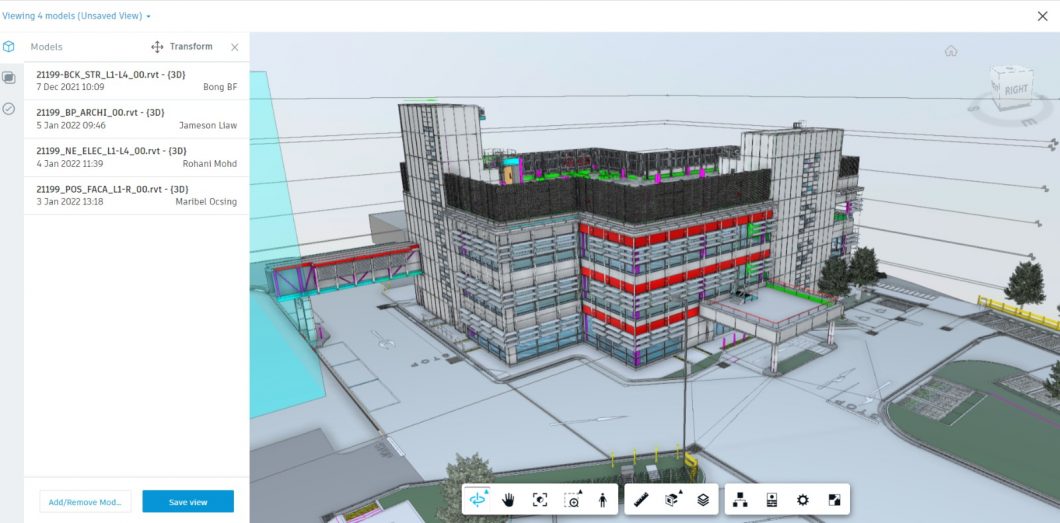
For over 20 years, Boustead Projects Limited has been a leading provider of innovative real estate solutions with an international presence across Singapore, China, Malaysia, and Vietnam. Its core business is in industrial design-build and development projects, covering over 3 million square metres of real estate regionally.
Its service offering covers turnkey engineering, full-fledged integrated digital delivery (IDD), and construction and project management encompassing design-and-build; but also real estate development, leasing, and asset management. To date, Boustead has completed projects worth more than $2.8b.
With the introduction of Autodesk Construction CloudTM, Boustead Projects has connected design to construction, expediting or even eliminating steps within internal processes. This helps the business significantly reduce operational and administrative reporting for their project teams, whilst also streamlining project management for all stakeholders involved.
As part of their ongoing commitment to digital transformation, Boustead turned to Autodesk to harness technology to further connect design to construction, to drive new efficiencies and streamline their processes.
For us, digital transformation is not just about adding a set of digital tools, or applications to work processes, but rather changing what we have been doing for the past maybe 10 to 20 years in the industry.”
—Muhammad Khalil Bin Shaiful Bahari, Senior Digital Delivery Manager Digital BIM, Boustead Projects E&C Pte Ltd.
Like many construction firms of its scale and breadth of capabilities, Boustead was using several different software solutions and processes across teams, project stakeholders, and locations. These siloed systems meant processes weren’t as efficient as they could be, leading to delays and disruptions from miscommunications.
“We wanted to create a streamlined environment and a single source of truth for our teams. But also capitalise on the latest technologies like machine learning and advanced analytics. Autodesk is a big player in our industry and naturally, we looked to them for the right solution,” shared Khalil.
As a longtime user of Autodesk Revit and Navisworks, Boustead added Assemble, Autodesk BIM Collaborate, and Autodesk Build within the Autodesk Construction Cloud unified platform to their existing product portfolio. These additions enabled the firm to move away from communications driven by email and file transfers to a more centralised ecosystem that would help them better manage every step of the project process.
Adding Autodesk Build to their construction solution stack enables Boustead to implement an effective IDD framework process with a single source of truth for the entire building lifecycle to ensure that Revit BIM models, drawings, RFIs, and document submissions by different stakeholders are shared effectively. As a result, processes that once took days, have now been expedited or even eliminated. Approvals can now be given directly in Autodesk Build, avoiding the potential for data loss and delays that can arise with email approvals.
The business now has improved reporting capabilities for site progress, cost, safety, and technical compliance reports. Many of these activities are automatically generated and secured within the platform with no need to recreate them or risk replication or misplacing them. Their previous five-step site visit reporting process is now down to just three, utilising Autodesk’s mobile solution. Upon arrival at the site, project managers can capture images and data, and easily upload these into pre-existing templates to be shared with project stakeholders instantly.
Introducing Autodesk Build has also led to new levels of transparency within project teams. Clients, contractors, and sub-contractors can now have an open view of and seamless access to project data and reporting.
Khalil says that ultimately, the improved transparency and access to data and reporting has meant clients and partners are happier throughout the process and work more collaboratively. “Take for example Project Takeda, a 4-storey office building at Woodlands Industrial Park in Singapore. While the client doesn’t require the use of Autodesk Build, taking the initiative on our side has led to several productivity gains and improved collaboration on all fronts,” he adds.

Amidst the COVID-19 pandemic and the disruption and challenges it caused across the construction sector, Boustead was able to continue to work remotely and safely since it already migrated much of its data and processes to the cloud. Swapping on-site inspections for virtual inspections and sharing the outputs and data instantly using Autodesk Build, meant maintaining accurate and dependable reporting.
Boustead has been utilising the Autodesk PlanGrid Build Mobile application to ensure approved BIM drawings and relevant documents are accessible from anywhere, anytime. This eliminates the risk of referring to wrong paper drawings onsite, causing mistakes and delays. On-site teams can also instantly access previous meeting minutes to ensure they can cross reference what was agreed upon during those meetings. This ensures teams are always referring to the latest approved published drawings during inspection to avoid unnecessary work.
“Without the use of Autodesk Build, our project managers’ time would be strained by admin and reporting. Now they are free to focus on mission-critical tasks. They are happier and empowered to work more effectively and use their time more valuably,” says Khalil.
Another feature of Autodesk Build that Boustead has found beneficial is data visualisation and the increased ability to analyse their data. Based on project data, issues with technical non-compliance can be predicted and avoided, whilst sub-contractor response times can be measured to see how effectively partnerships are working and better predict project timelines.
Boustead is now looking to expand their use of Autodesk to more projects, increasing the size of the dataset they can learn from to create smarter predictive models and better inform future project plans.
“The data visualisation is very clear and provides credible evidence to support our decision-making and future plans. We’re keen to continue to utilise this data and predictive analytics, building a bigger and bigger dataset as we increasingly utilise Autodesk Build,” concludes Khalil.
Click here to learn more about the capabilities and benefits of Autodesk Build, and how it can help your business.
